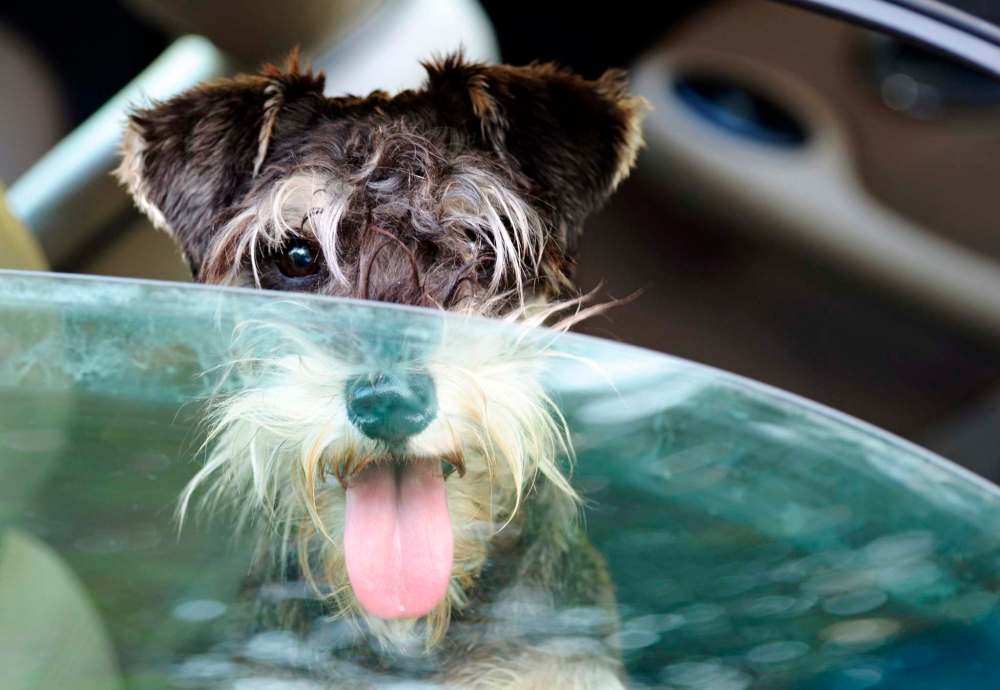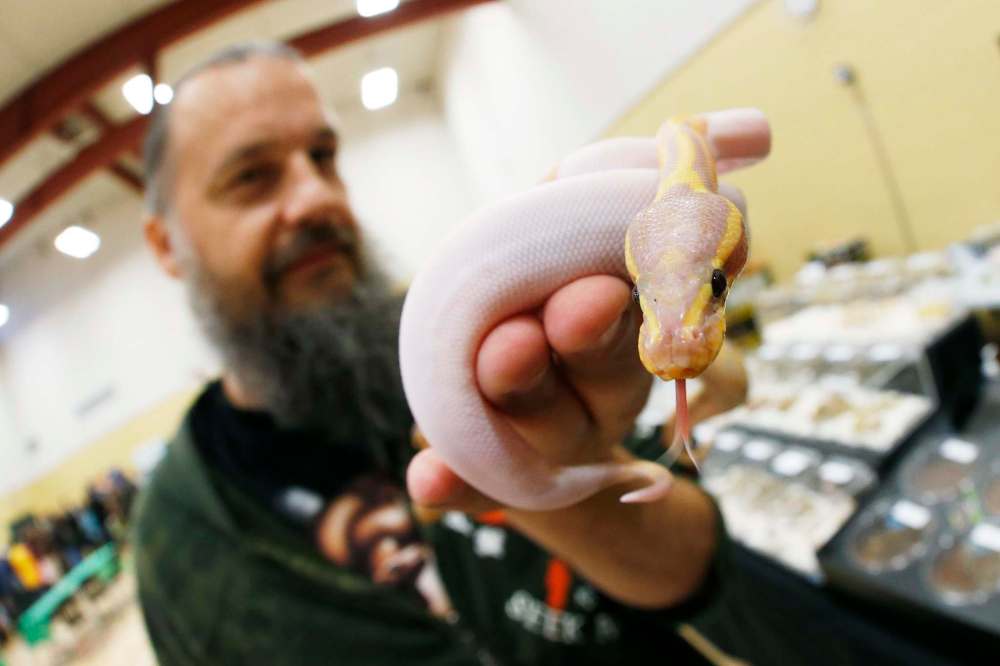Pit bulls legal, ball pythons banned? Proposed changes to pet bylaw would see new ownership rules, improvements to animal safety
Read this article for free:
or
Already have an account? Log in here »
To continue reading, please subscribe:
Monthly Digital Subscription
$0 for the first 4 weeks*
- Enjoy unlimited reading on winnipegfreepress.com
- Read the E-Edition, our digital replica newspaper
- Access News Break, our award-winning app
- Play interactive puzzles
*No charge for 4 weeks then price increases to the regular rate of $19.00 plus GST every four weeks. Offer available to new and qualified returning subscribers only. Cancel any time.
Monthly Digital Subscription
$4.75/week*
- Enjoy unlimited reading on winnipegfreepress.com
- Read the E-Edition, our digital replica newspaper
- Access News Break, our award-winning app
- Play interactive puzzles
*Billed as $19 plus GST every four weeks. Cancel any time.
To continue reading, please subscribe:
Add Free Press access to your Brandon Sun subscription for only an additional
$1 for the first 4 weeks*
*Your next subscription payment will increase by $1.00 and you will be charged $16.99 plus GST for four weeks. After four weeks, your payment will increase to $23.99 plus GST every four weeks.
Read unlimited articles for free today:
or
Already have an account? Log in here »
Hey there, time traveller!
This article was published 11/08/2021 (1585 days ago), so information in it may no longer be current.
Laura Baker has wanted a pit bull for 20 years, but hasn’t bought one because of the city’s ban.
“I just feel like the whole breed has been so misrepresented, misunderstood and given a raw deal in terms of being able to find loving homes,” the St. James resident said.
If proposed changes to a city bylaw pass, Baker will legally be able to own a pit bull, while it could become illegal to feed wildlife and to leave pets in vehicles at certain temperatures.
The city is looking for feedback on suggestions to its Responsible Pet Ownership bylaw. Winnipeg Public Service reviewed the rules this summer and came back with a number of ideas, including a removal of breed-specific bans.
Winnipeg’s pit bull ban has been around since 1990. The breed is known for its aggressive nature.
However, Winnipeg and Ontario are the only major Canadian jurisdictions to have breed-specific legislation, according to a city report.

Baker said she knows several people in Winnipeg who own pit bulls despite the law — their vets classify the animals as mixed breeds to avoid difficulty.
Carla Martinelli-Irvine, the founder and executive director of Winnipeg Pet Rescue Shelter, would applaud the ban’s removal.
Her charity has turned many pit bulls away because they’re illegal to own.
“I really believe that the majority of the cases (of aggression are) because the animal has had terrible ownership,” she said.
Public Service suggested creating an “at risk” category for irresponsible pet owners — a step before the “dangerous dog” designation the city currently has.
“By adding that ‘at risk’ category, that… allows us to take a person and say, ‘Hey, maybe you need to get a harness for this dog; maybe you need to put a muzzle on your dog,’” said Leland Gordon, the general manager of the city’s animal services.
“By adding that ‘at risk’ category, that… allows us to take a person and say, ‘Hey, maybe you need to get a harness for this dog; maybe you need to put a muzzle on your dog.’” – Leland Gordon, the general manager of the city’s animal services
Another proposed change would prohibit people from leaving their dogs and cats in vehicles when it’s hotter than 22 C or colder than -10 C outside. Idling cars with working air conditioning would be exempt.
“I think 22 (C) can still get very hot,” Martinelli-Irvine said. “I think 20 degrees could still be high.”
The change would also make it illegal for cyclists to ride with dogs tethered to their bikes when it’s 22 C or warmer.
Tethering a dog outdoors or keeping it in outdoor housing around the clock could also become illegal, as per a suggestion in the Public Service report.
“I’m very, very happy about that,” Martinelli-Irvine said. “People are appalled when they see an elephant chained up 24-7. We should be appalled when a dog is chained up 24-7.”

The exotic pet industry may also be affected by the bylaw changes. The city is looking to move from a list of banned exotic pets to a list of allowed pets, citing animals’ quality of life, public safety, disease risk and the global exotic animal trade as reasons for the list.
Casey Trizpit, the owner of Winnipeg Reptiles, said he might sell his business if that’s the case.
“It makes no sense,” Trizpit said. “Reptiles here, in Winnipeg, aren’t an issue. You don’t have animal services full of reptiles.”
The suggested list includes three types of snake, 11 kinds of lizard and gecko, and various rodents, birds and fish. Frogs and turtles are not included.
“Half of the lizards that they have on that list as allowed, you don’t even see them in the pet trade,” Trizpit said.
The shop owner breeds ball pythons, various geckos and tortoises — which he’s been working with for almost a decade — and would have to sell them all.

Trizpit said if he doesn’t breed an animal, he buys from other local breeders, not people selling wild catches.
“We are not an issue, so why the constant attack on this community?” he said.
City employees worked with the Winnipeg Humane Society and other stakeholders to develop the allowed-animals list; it’s open to changes, Gordon said. People who currently own pets not on the list would be able to keep them
Winnipeg is also looking to curb its cat and dog population. It may require spaying and neutering of those animals over six months old.
Winnipeggers could still be breeders, but they’d need a breeding permit.
“Essentially, breeding in Manitoba is unregulated,” Gordon said. “The basic idea is… you’re just going to have to be a responsible pet owner. We’re going to have to check out the living conditions of where the animals are, just very basic things.”
“Essentially, breeding in Manitoba is unregulated. The basic idea is… you’re just going to have to be a responsible pet owner. We’re going to have to check out the living conditions of where the animals are, just very basic things.” – Leland Gordon
The report suggests a limit of one litter per year, with no more than four litters over an animal’s lifetime.
The proposed bylaw changes don’t solely focus on pets: if passed, it may be illegal to feed wildlife, with the exception of bird feeders.
Last year, officials found 1,359 wild animals dead on city streets, according to the city’s count.
“If we want to minimize conflicts with wildlife… the last thing we should be doing is feeding wildlife,” Gordon said.
The Responsible Pet Ownership bylaw went into effect in 2013. This fall, city employees will refine their bylaw recommendations. Council will review them in January; the bylaw is set to be amended then.
The full list of suggestions is on engage.winnipeg.ca. People can give their feedback by emailing RPObylaw@winnipeg.ca or calling 311.
gabrielle.piche@freepress.mb.ca

Gabby is a big fan of people, writing and learning. She graduated from Red River College’s Creative Communications program in the spring of 2020.
Our newsroom depends on a growing audience of readers to power our journalism. If you are not a paid reader, please consider becoming a subscriber.
Our newsroom depends on its audience of readers to power our journalism. Thank you for your support.
History
Updated on Wednesday, August 11, 2021 7:28 PM CDT: Updates story









